Afghanistan: Tired, overwhelmed Afghan families start new lives in the UK
- Published
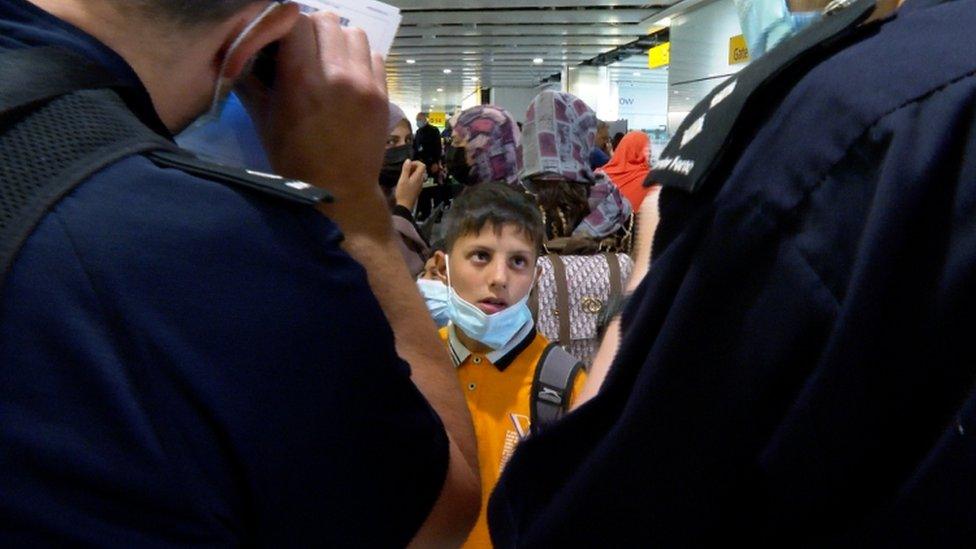
Welcome to Britain: Families bewildered - but relieved at Heathrow
Tired, occasionally scared - but mostly overwhelmed - shortly after 09:00 on Thursday, Afghan families walked through Heathrow Airport to a new life.
Children gripped their parents' hands. Grandparents clutched folders of identity documents proving their right to come to the UK. Volunteers from the Red Cross handed out food parcels with sandwiches - a very British welcome.
For the third day running, Heathrow has received thousands of Afghan refugees into the UK.
Whatever the questions about the effectiveness of the UK and international response to the unfolding disaster in Afghanistan, the operation to oversee the arrival of those who have managed to get out is enormous.
Since Tuesday, Heathrow's Terminal 4 has become a refugee processing hub - along with smaller operations at Birmingham International and RAF Brize Norton.
The airport is receiving around five flights a day, bringing more than 1,000 Afghans to safety - part of 15,000 who have arrived so far.
As they arrived in the reception hall, the refugees looked around as Border Force officers and Heathrow staff ushered them to seating.
Children were given packs of colouring crayons, officials explained to them how each family group would have to go through an identification and verification process.
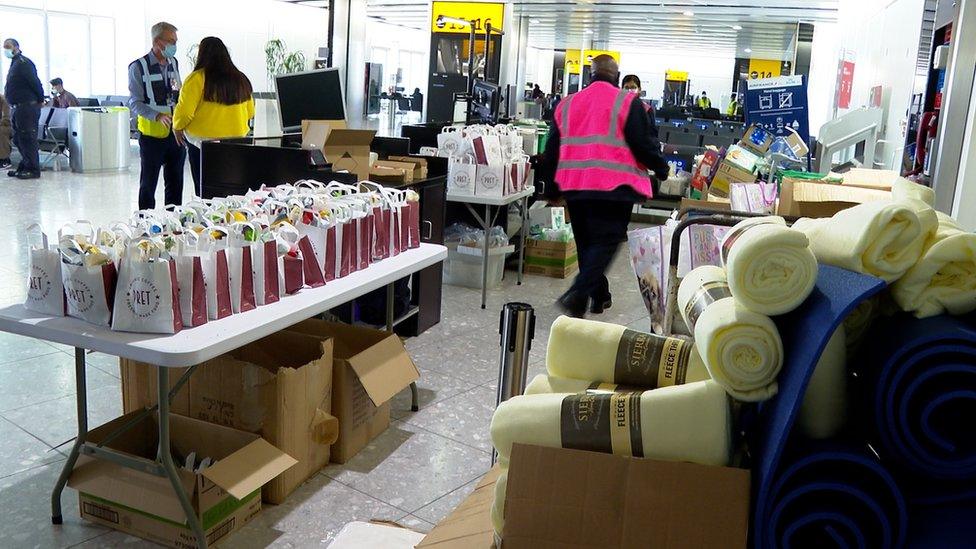
Care packages: Food and blankets at the ready
Some of the arrivals had full documentation - passports and proof of their links to the UK. Others had fewer records - some only birth certificates.
Wahis, a British-Afghan, had taken the unusual step of returning to the homeland he fled as a refugee to find and bring his younger sisters and their small children to safety.
As he sat in the hall, watching relatives being fingerprinted as part of the checks and registration for new identity documents, his relief was palpable.
"The Taliban are literally driving around every day, in certain roads, they try to find certain people," he told me.
"They went through [the family] house - they would have probably taken my sisters. That's what they do."
The process to receive the refugees has involved a cross-government operation.
NHS staff, from GPs to ambulance personnel, are responding to immediate medical concerns.
Each day a handful of passengers have gone to hospital, often because they have arrived without vital medicines.
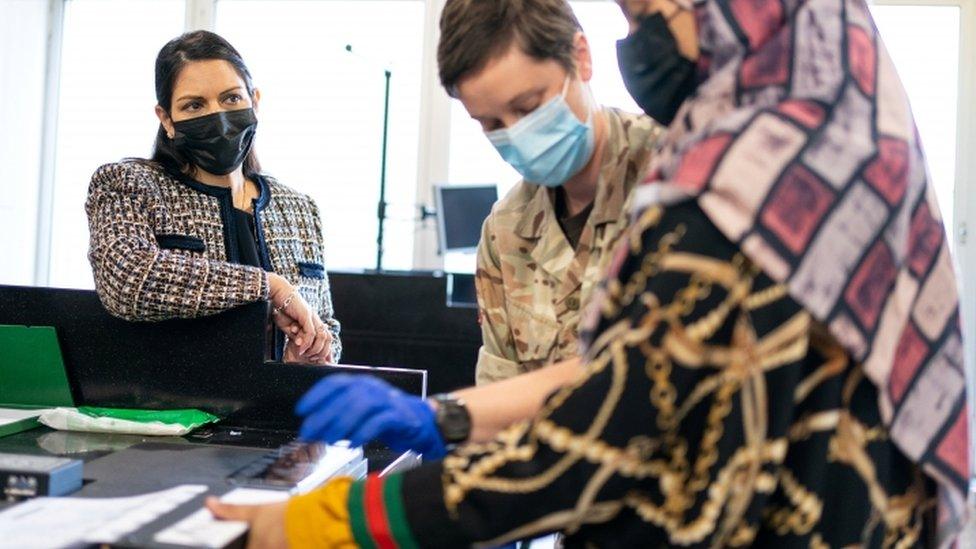
A woman is registered and her fingerprints taken as the home secretary looks on
Each family group in turn has their bundle of identity documents checked by Border Force officers, assisted by the military.
The final stage of their arrival is a review of all the individual information by police officers who work in counter-terrorism - looking out for suspects trying to smuggle themselves in.
So far, there's been only one publicly confirmed serious security alert. An individual who arrived at Birmingham was on a "no-fly" list - which can cover a range of concerns. Detectives later established the individual's listing was unrelated to terrorism.

What happens to Afghan refugees coming to the UK?
Arrivals on official flights enter a 10-day Covid quarantine in a hotel
Government officials and local authorities are trying to find them permanent homes
A shortage of suitable accommodation means many will be placed in hotels
Some will get refugee status and can live in the UK permanently
Others will get a five-year visa to live and work in the UK - and can then apply for permanent residence
Afghans arriving independently will enter the normal system for asylum claims - which has a backlog of 70,000 people
These people cannot settle, or work, while their claims are considered
The government has promised a new safe route for Afghan resettlement

Once the checks are complete, the families are taken to a Covid quarantine hotel for 10 days. From there they are distributed to local authorities - although Home Office officials have admitted in the past week that the hunt for suitable housing, particularly for large families, has become challenging.
But before that happens, the officials welcoming the refugees at the airport have to put them at ease. Step forward Dorna, a Border Force translator.
She's had an emotional rollercoaster of a week, telling family after family they now have nothing to fear - and everything to hope for. She told me that her daily goal is to remain professional - to keep her emotions in check as she does her duty to help people feel safe.
"It's terrifying for a lot of them but luckily I've been able to communicate with some of them by speaking Farsi," she said.
"It's helped massively. The uniform will scare a lot of people. It's been good in the sense that a lot of people are opening up and they're realising we're not scary, we're not going to hurt them, we're here to help."
Officials at the airport have heard stories that have confirmed what everyone suspects. Despite the Taliban presenting a new public face, some of those arriving have experienced abuses. One man with ties to the British military was beaten and whipped by militiamen as he struggled to get through the Taliban's check-points to Kabul's airport.
Another woman showed me footage on her phone of a Taliban fighter sneaking around her family home in the dead of night.
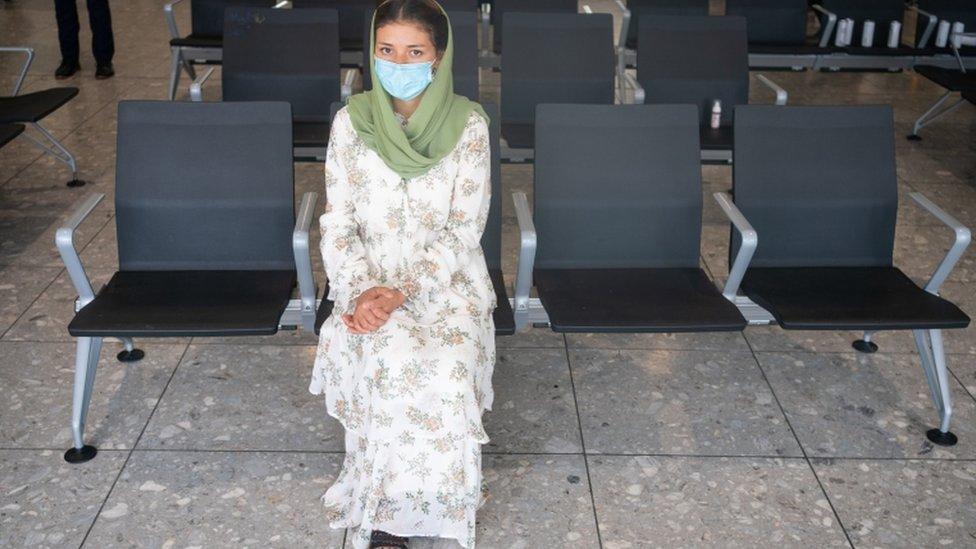
Malalai Hussiny wants to continue to learn English, return to university and become a journalist
It was an open secret in the neighbourhood that her father had worked in the British embassy. Seeing the fighter lurking convinced them they had to get out.
Malalai Hussiny, 20, abandoned her university course to flee with her extended family.
She wants to continue to learn English, return to university and follow her ambition to become a journalist.
As she rested in the arrivals hall, she couldn't contain her feelings.
"I am very happy to be here because the UK has helped us, our people in Afghanistan are coming here. I am so very happy - and now me and my family safe here. Thank you a lot in UK."
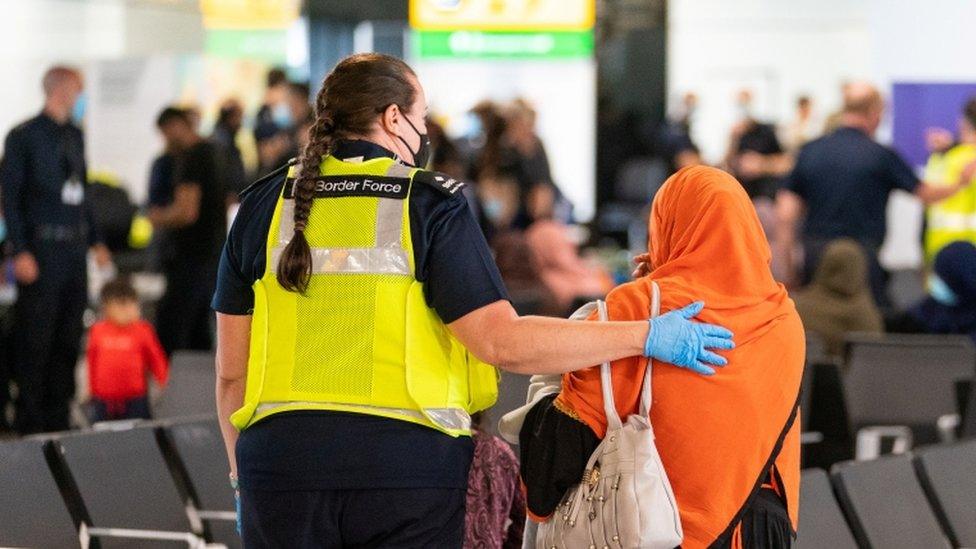
Many of those arriving were unsure what to expect
For those left behind the Kabul bombing has underlined not only that time is running out - but the questions ministers face about how quickly they have acted.
Priti Patel, the home secretary, spoke to families as they arrived on Thursday - and she defended the government's response.
"We are working night and day, my colleagues in government and internationally and in the region, looking at safe passage and safe and legal routes," she said.
"Our priority first and foremost is to save lives. Also, if you look at what we're doing around immigration - they are our absolute priority and we will make sure, find ways we can get them here and of course importantly we've got to regularise their status."
Nick Thomas-Symonds, the shadow home secretary for Labour, has accused the government of leaving huge numbers of people at risk of losing their lives.
"We still don't know when these supposed safe routes will open or how people fearing for their lives will be able to access help once the airport closes, and the military has left," he said.
